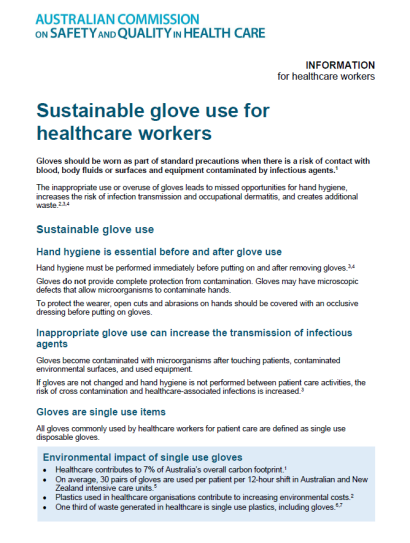Sustainability and infection prevention and control
Environmentally sustainable infection prevention and control (IPC) practices improve the safety and quality of health care for patients.
Sustainability and the basics of IPC
IPC programs play an important role in improving environmental sustainability in healthcare. IPC practices should aim to reduce the spread of infections while also considering the longer-term impact of practices on the environment. Interventions such as sustainable glove use and reducing waste will help to reduce the carbon footprint in healthcare.
The Preventing and Controlling Infections Standard
Action 3.03g (Applying quality improvement systems) of the National Safety and Quality Health Service (NSQHS) Standards Preventing and Controlling Infections Standard requires health service organisations to have systems in place to support and monitor the safe and sustainable use of IPC resources.
Fundamental IPC practices such as hand hygiene and appropriate glove use are simple and practical measures that support sustainable health care.
Fact sheet - Sustainable glove use for healthcare workers
This fact sheet provides guidance on the appropriate use of gloves for healthcare workers, including information on environmental sustainability and the impact of inappropriate glove use on patient safety.
Case studies
These case studies can assist health service organisations to embed appropriate and sustainable use of personal protective equipment in their IPC programs.
Share your story
The Commission is seeking case studies from health service organisations to share experiences of implementing sustainable IPC programs
If you have been involved in a successful sustainability project related to IPC and would like to share your story, please contact HAI@safetyandquality.gov.au
For operating theatres
Operating theatres are major contributors to a health service organisation’s carbon footprint. Operating theatres rely heavily on single use products, fluids, and sterilisation procedures/chemicals to operate efficiently, all of which have a significant impact on the environment.
Resources that provide guidance to minimise the impact of operating theatres on the environment include:
- The Green Surgery Report – Reducing the environment impact of surgical care - developed by the Centre for Sustainable Healthcare, and UK Health Alliance on Climate Change, and endorsed by the Royal Australasian College of Surgeons
- New South Wales Health Surgery resources webpage, including a link to the Green Operating Theatre Sustainability Quiz.
Commission resources
For more information please go to the Environmental Sustainability and Climate Resilience Healthcare Module page on our website.


